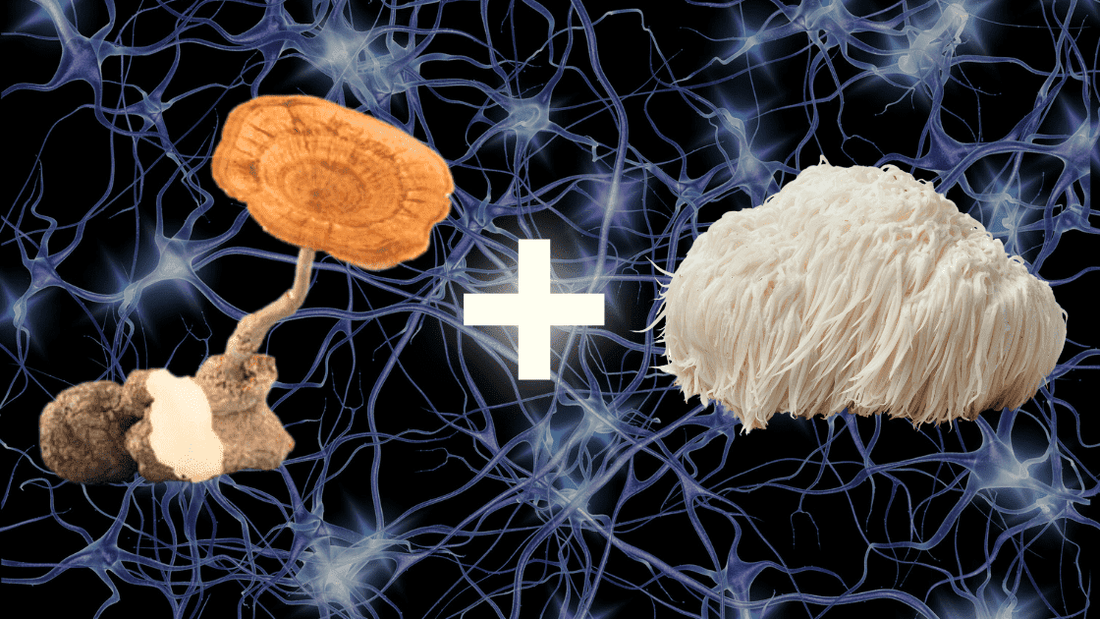Lion’s mane has gained much popularity for its brain boosting properties.
But tiger milk mushroom is also starting to get recognition for its brain health benefits.
And for good reason.
Like lion's mane, tiger milk mushroom promotes cognitive health and has neuroprotective properties.
But it does it in a different way.
While lion's mane stimulates the production of nerve growth factor (NGF), tiger milk mushroom compounds attach directly to TrkA receptors.
This begs the question, could lion’s mane and tiger milk work together synergistically to potentially amplify their individual benefits?
Before we explore this idea, let’s look at the individual mushrooms and how they work.
What is lion’s mane mushroom?
Also known by the latin name Hericium Erinaceus, lion’s mane is a beautiful mushroom that grows throughout the northern hemisphere.
It’s a large, white, shaggy-looking mushroom that resembles a lion's mane as it grows.

Usually found growing on dead hardwoods, lion’s mane has been used in traditional Chinese medicine for centuries and its production is widespread within Asia.
Lion’s mane is also common in gourmet cooking, with young specimens offering a great steak-like texture when pan-fried.
What is tiger milk mushroom?
Tiger Milk Mushroom, scientifically known as Lignosus rhinocerus, is a rare and medicinal mushroom native to the tropical forests of Southeast Asia, including Malaysia, Thailand, Indonesia, the Philippines, and Papua New Guinea.
It's prized for its health benefits and has been used in traditional medicine for centuries.
It was even used to relieve the chronic cough of Malaysia’s 4th& 7th Prime Minister, Tun Dr. Mahathir Mohamad.
More recently, it’s becoming known in the west as a powerful functional mushroom that offers some unique health benefits, particularly for the respiratory system and brain.

Benefits of lion’s mane
Here is a list of science-backed health benefits of lion’s mane mushroom:
Brain health: Lion's mane contains compounds called hericenones and erinacines, which can stimulate the production of nerve growth factor (NGF), a protein essential for the growth, maintenance, and survival of neurons.
This may allow lion’s mane to improve cognitive function, enhance memory, concentration, and overall mental clarity.
Due to its neuroprotective properties, lion's mane may have potential benefits in conditions like Alzheimer's disease and Parkinson's disease by reducing amyloid-beta plaque buildup and protecting against neuronal damage.
Mental health: Some research indicates that lion's mane may help alleviate symptoms of anxiety and depression, possibly thanks to its anti-inflammatory effects and its ability to enhance NGF production.
Immune system: Lion's mane contains polysaccharides, which can modulate the immune system, enhancing its ability to fight infections and illnesses.
Digestive health: The mushroom may help protect the lining of the stomach and intestines, reducing the risk of ulcers and other gastrointestinal issues. It has also been shown to promote the growth of beneficial gut bacteria, supporting overall digestive health.
Anti-inflammatory and antioxidant properties: Lion's mane has significant anti-inflammatory properties, which can help reduce inflammation throughout the body. This can be beneficial in managing chronic inflammatory conditions and improving overall health.
The mushroom is also rich in antioxidants, which help protect cells from oxidative stress and damage caused by free radicals. This protection can reduce the risk of chronic diseases, such as cardiovascular disease and cancer.
Cardiovascular health: Lion's mane may help in reducing levels of LDL (bad) cholesterol and triglycerides, while increasing levels of HDL (good) cholesterol. This can contribute to improved cardiovascular health and reduced risk of heart disease.
Metabolic health: Some studies suggest that lion's mane can help regulate blood sugar levels, which may be beneficial for people with diabetes or those at risk of developing diabetes.

Benefits of tiger milk
Tiger Milk Mushroom is gaining a lot of attention for its numerous health benefits, which include:
Brain health: Like lion's mane mushroom, tiger milk mushroom has neuroprotective properties and promotes cognitive health. Instead of directly stimulating NGF, the bioactive compounds in tiger milk mushroom attach to TrkA receptors, leading to increased neuroplasticity.
Immune system: Tiger milk contains compounds like polysaccharides, which have been shown to support the body's immune response, helping to fight off illnesses.
Anti-Inflammatory properties: The mushroom is used to reduce inflammation and treat conditions like asthma and allergies. A 2019 study by researchers in Malaysia found that 75% of around 100 participants with asthma, persistent coughs, sinus issues, and joint pains experienced benefits from Tiger Milk Mushroom.
Respiratory health: It's commonly used to alleviate respiratory issues, such as coughs and bronchitis. This 2021 study found tiger milk extract supplementation effectively improves respiratory health, immunity and antioxidant status.
General wellbeing: Traditionally, it’s been used as a tonic to improve overall health and vitality.
Should you combine tiger milk and lion’s mane?
Most people take lion’s mane for its brain boosting properties (lion’s mane promotes Nerve Growth Factor, brain cell production, mood and memory).
But tiger milk mushroom is also starting to get recognition for its many benefits.
And for good reason.
Like lion's mane, tiger milk mushroom promotes cognitive health and has neuroprotective properties.
However, instead of directly stimulating Nerve Growth Factor (NGF) like lion’s mane, the compounds in tiger milk mushroom attach to TrkA receptors, leading to the neural growth.
TrkA receptors are found on the surface of cells and are critical for neuronal health, synaptic plasticity, and the structural integrity of neural networks.
Through these processes, they play a critical role in learning, memory, and overall cognitive function.
TrkA receptors bind to NGF, which leads to the activation of cell survival and growth.
And remember, lion’s mane stimulates NGF production.
So does this mean that tiger milk and lion’s mane work even better when used together? It’s certainly plausible.

One study showed that when a tiger milk extract was administered alongside NGF, neuronal growth was increased compared to tiger milk on its own.
This may have implications on the treatment of neurodegenerative diseases, chronic Pain (TrkA receptors are also involved in pain signaling pathways), and neurodevelopmental disorders.
More research is obviously needed, but there is good evidence that both mushrooms improve brain cell survival and growth on their own.
So it makes sense that they could work even better when administered together.
Final thoughts
While lion's mane stimulates the production of nerve growth factor (NGF), crucial for neuron survival and growth, tiger milk mushroom compounds attach to TrkA receptors, promoting neuroplasticity and neuronal health.
This synergistic effect could potentially amplify their individual benefits, improving brain cell survival, growth, and overall cognitive function.
Although more research is needed to fully understand their combined effects, existing evidence suggests a promising potential for these mushrooms to work better together, especially in treating neurodegenerative diseases, chronic pain, and neurodevelopmental disorders.
See our range of lion’s mane, tiger milk, and other mushroom extracts here.






